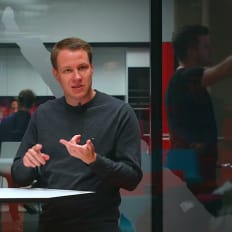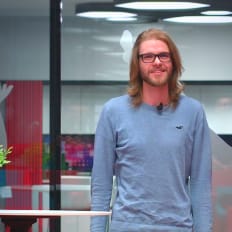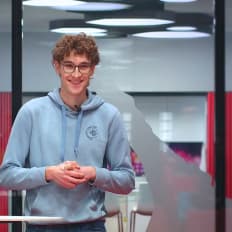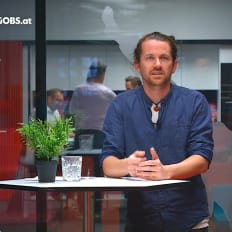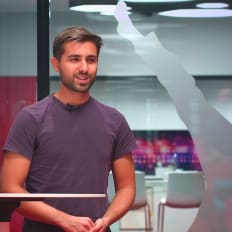
ECO-Soft GmbH
Hans Burgstaller, Full Stack Developer bei ECO-Soft
Description
Hans Burgstaller von ECO-Soft gibt im Interview Einblicke in die Entstehung des Unternehmens, das heutige Development Team, die Technologien die dort zum Einsatz kommen und wie das Recruiting im Unternehmen gestaltet ist.
By playing the video, you agree to data transfer to YouTube and acknowledge the privacy policy.
Video Summary
In Hans Burgstaller, Full Stack Developer bei ECO-Soft, Hans Burgstaller traces the path from a solo developer (founded in 1994) to a tight-knit team that recently moved into a client’s office to work more effectively. Hiring centers on apprentices: German fluency is required, cultural fit is assessed, and candidates prove themselves in 1–2 day trial sessions by writing code and independently researching solutions; training is largely in-house and many stay. Technically, he prioritizes substance over hype—skeptical of the cloud for strategic-knowledge reasons, while remaining open to new technologies like AI without chasing every trend.
Apprenticeship over Hype: Hans Burgstaller of ECO-Soft GmbH on building teams, pragmatic engineering, and saying no to the cloud
Context: What we heard in “Hans Burgstaller, Full Stack Developer bei ECO-Soft”
We watched the session “Hans Burgstaller, Full Stack Developer bei ECO-Soft” and found a crisp, grounded view on how to build software teams that last: train people yourself, keep technology choices intentional, and value initiative over buzzwords.
Right from the start, Burgstaller sets the tone:
“Also ich bin das Urgestein in der ECO-Soft. […] Ich programmiere jetzt seit 1987, 1988 und habe dann 1994 die Firma gegründet.”
His own path shapes the company’s DNA: practical, resilient, and deliberate. That shows up in how ECO-Soft GmbH hires, collaborates, and makes tech decisions.
From solo to a small team: growing with intention
ECO-Soft didn’t begin as a team; it began as a one-person shop. The market made it clear that customers wanted stability beyond a single individual.
“Originally it was intended that I do it alone, but companies came to me and said, well, one person alone—if he drops out—isn’t optimal.”
The first employee arrived in 2006; in 2007 the ECO-Soft entity was founded. Burgstaller is frank about the hardest phase:
“The hardest time was definitely the first when you are two, because suddenly you need twice as much work. And if one person drops out again, then suddenly you do twice as much work.”
Today, the team is “round,” as he puts it—steady rather than flashy. Growth happens at the pace of real business and culture. That honesty signals durability: ECO-Soft grows when it makes sense, not because it sounds good in a headline.
Working at the customer’s site: proximity that boosts productivity
A recent change in office setup shows ECO-Soft’s pragmatic view of collaboration:
“We recently changed location. We moved in with a customer and I think this is really a good way to work.”
Sitting close to customers means fewer translation loops, more direct communication, and faster decisions. For engineers who want to be close to real problems and see the impact of their work, that proximity is compelling. Less abstraction, more reality.
Hiring, the ECO-Soft way: apprentices first
When Burgstaller talks about hiring, the core principle is unambiguous: build talent from within and keep it.
“As a rule, with few exceptions, we always hire apprentices. […] we train people ourselves.”
And it works:
“Most people […] were apprentices with me and then stayed.”
That’s employer branding through consistency. No fanfare—just the practice of training, retaining, and growing people. It’s an environment designed for on-the-job learning, guided by someone who has been programming since the late 1980s.
The path in: AMS, DevJobs, website—and a real-world trial
ECO-Soft recruits via a few focused channels:
“We’re listed with AMS, now at DevJobs, and maybe there’s a click from the homepage here and there.”
The distinctive element is the quick, tangible reality check:
“If someone applies, we first check whether they could fit. […] then we bring them in or invite them straight to a trial day. Everyone we like gets to try out for one or two days.”
This trial is the centerpiece of selection. It shows who actually wants to work—and what “work” means in the ECO-Soft context.
What matters: German, initiative, and hands-on attitude
Burgstaller lays out expectations clearly. It’s not about certificates—it’s about behavior and mindset.
- German is non-negotiable:
“With us it’s important that he speaks German. We are clearly not an international company.”
- Team fit is openly assessed.
- During the trial, you’re expected to build, not just observe.
“It’s really bad if a trialist comes in, gets everything explained, reads through it, and writes no lines in the program—then he’s not suitable.”
- Self-reliance is welcome and expected:
“Those who start working right away and, if they get stuck, look things up on the internet to find a way forward—those are the ones we need.”
This is ECO-Soft’s culture in a nutshell: don’t wait for a spoon-fed solution; ask, try, look it up, iterate, learn.
A lived tech history: from DOS to Windows to the cloud—why it’s okay to hit the brakes
Burgstaller has lived through major platform shifts. He remembers black screens, 80 columns, and 25 rows—and the messy early days of GUI systems:
“When I started programming, the screen was just black—it had 80 characters and 25 lines. […] I saw the transition from the DOS world to the Windows world and how it sucked at first until it slowly started running smoothly.”
That experience informs how he views the current push toward the cloud:
“Now the whole world tends towards everything going to the cloud. That’s a development I don’t like. We’re explicitly putting on the brakes there, because I believe IT is a strategic lever that a company should secure. And anyone who moves to the cloud is basically throwing away this know-how, this knowledge.”
This isn’t a blanket rejection of modern tech. It’s about sovereignty, ownership of knowledge, and avoiding needless dependency. Modern capabilities are adopted—selectively:
“Of course we want to take along new technologies like AI and so on, but we won’t chase every trend.”
For candidates, that means you won’t be forced into cloud-first dogma. You’ll make architecture decisions that prioritize long-term customer interests. If you equate engineering with thoughtful tradeoffs rather than buzzwords, ECO-Soft will feel like home.
Engineering culture at ECO-Soft: learn, deliver, look things up
Taken together, a clear picture emerges of how engineering works here:
- Learning by doing: you write code early, on real tasks, and get feedback.
- Self-service as a principle: read docs, search the web, figure out next steps—rather than waiting for a “solution packet.”
- A quality mindset without dogma: Burgstaller didn’t talk tools or frameworks; he talked behavior. That behavior reliably yields robust, maintainable solutions.
- Customer proximity drives the tempo: being near customers compresses feedback loops and fosters ownership.
This culture is the natural extension of the apprenticeship model. Training people internally requires didactics, clear expectations, and evaluating performance by observable behavior—not by fashionable acronyms on a CV.
Why ECO-Soft GmbH is attractive to tech talent
Not every engineer wants the same environment. If the following resonates, ECO-Soft is worth a closer look:
- You want to learn the craft by doing—writing real code from day one. The trial day makes that explicit.
- You prefer clarity to vague job specs. At ECO-Soft, what matters is unambiguous: initiative, team fit, German, and visible output.
- You value experience. A founder who has been programming since 1987/88 and lived through DOS-to-Windows transitions brings deep intuition for robust systems.
- You don’t crave hype. New tech like AI is welcome, but trend-chasing is not the goal.
- You want to work close to customers and see your impact. The on-site proximity makes it tangible.
- You find long-term development more compelling than rapid role hopping. ECO-Soft trains apprentices—and many stay.
These aren’t marketing lines; they mirror the session’s statements.
How the application journey works—at a glance
From what Burgstaller shared, the pathway looks like this:
- Apply via AMS, DevJobs, or the website.
- Initial check for team fit and the German language requirement.
- If the gut feeling is good, you’re invited to a one- or two-day trial.
- During the trial: do the work—write code, look things up independently, ask questions.
- Decision based on the initiative and output you’ve shown.
No multi-round assessment theater, no buzzword bingo—just a realistic look at how collaboration would work.
Leadership in the small things: the courage to say no
A striking trait at ECO-Soft is the readiness to slow down when it’s the right thing to do. Burgstaller states this explicitly in the context of the cloud. Behind that is a leadership principle: good decisions protect the customer’s strategic interests, even if that means resisting hype and retaining knowledge in-house.
Leadership here isn’t about grand org charts. It shows up in many small principles: train apprentices, hand over responsibility early, work close to customers, and set clear expectations. That reduces friction and raises reliability—internally and externally.
Collaboration in everyday practice: what we heard between the lines
Even though the session is concise, the day-to-day mode is easy to infer from the facts stated:
- Communication in German—direct and frictionless, internally and with customers.
- Short paths rather than long process chains.
- Pragmatic decisions: relocate to a customer’s site if it improves the work.
- Focus on output: less talk about work, more actual work—dramatically visible in the trial day.
The result is the kind of productivity small teams excel at: shared purpose, visibility of progress, and transparency about why decisions are made.
A realistic view of career growth: impact first, then titles
Burgstaller’s reflection on the toughest phase (“two people is twice the work”) is more than an anecdote. It’s a reminder that real responsibility rarely comes neatly packaged—it’s often lumpy and urgent. Those who grow in such an environment learn faster and more deeply. ECO-Soft designs this reality for newcomers with care: clear guardrails (German, hands-on, initiative) and early opportunities (trial days, real tasks). Those who thrive tend to stay—“most” started as apprentices and are still there.
Technology with a point of view: modern where it matters, independent where needed
Openness to new tech (e.g., AI) alongside caution toward defaulting to the cloud signals deep responsibility to customers and to the company’s own know-how. It’s a counterpoint to “move fast and break things.” Think “move wisely and own your knowledge.”
In practice, that means technologies are tools, selected for stability, maintainability, and sovereignty—not because they make the loudest headlines.
Closing thought: ECO-Soft GmbH as a place for doers
“Hans Burgstaller, Full Stack Developer bei ECO-Soft” reveals a company that has stayed true to itself and, in doing so, has become compelling. Apprentices become colleagues. Customer proximity is daily practice, not a phase. Technology is a means, not an end. And the best way to signal you belong is to start doing—write code, look things up, show initiative.
“Those who […] look up things on the internet and find a way forward—those are the ones we need.”
For tech talent who bring exactly that drive, ECO-Soft GmbH can be the right place: a team with substance, shaped by experience, and a culture that doesn’t promise performance—it enables it.
More Tech Lead Stories
More Dev Stories
ECO-Soft GmbH Bastian Schmidt, Software Developer bei ECO-Soft
Bastian Schmidt von ECO-Soft redet in seinem Interview von seinem Werdegang als Developer – von den frühen Anfängen, bis hin zur aktuellen Arbeit als Developer – und welche Tipps er für Anfänger hat.
Watch nowECO-Soft GmbH Ricardo Reindl, Software Developer bei ECO-Soft
Ricardo Reindl von ECO-Soft erzählt in seinem Interview von den spielerischen Anfängen während der Schulzeit und über seinen weiteren Werdegang bis zum Software Development – und was das Wichtigste für Neueinsteiger ist.
Watch nowECO-Soft GmbH Tobias Hafner-Fuchs, Full Stack Developer bei ECO-Soft
Tobias Hafner-Fuchs von ECO-Soft spricht im Interview über seine Anfänge im Programmieren, was seine Aufgaben als Full Stack Developer im Team umfassen und gibt Empfehlungen für Einsteiger.
Watch nowECO-Soft GmbH David Kandler, Software Developer bei ECO-Soft
David Kandler von ECO-Soft spricht in seinem Interview davon, wie er seinen beruflichen Wechsel ins Software Development durchgezogen hat, wie er im Unternehmen gestartet hat und welche Tipps er für Beginner geben kann.
Watch now

